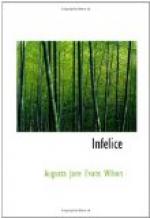“It was wickedly malicious in Mrs. Prudence to wound you; and we were all so anxious to shield you from every misgiving on your mother’s account. Some actresses have brought opprobrium upon the profession, which certainly is rather dangerous, and subjects women to suspicion and detraction; but let me assure you, Regina, that there have been very noble, lovely, good ladies who made their bread exactly as your mother makes hers. There is no more brilliant, enviable, or stainless record among gifted women than that of Mrs. Siddons’; or to come down to the present day, the world honours, respects, and admires none more than Madame Ristori, or Miss Cushman. Personal characteristics must decide a woman’s reputation, irrespective of the fact that she lives upon the stage; and it is unjust that the faults of some should reflect discreditably upon all in any profession. Individually I must confess I am opposed to theatres and actresses, for I am the widow of a minister, and have an inherited and a carefully educated prejudice against all such things; but while I acknowledge this fact, I dare not assert that some who pass their lives before the footlights may not be quite as conscientious and upright as I certainly try to be. I should grieve to see you on the stage, yet should circumstances induce you to select it as a profession, in the sight of God who alone can judge human hearts, your and your mother’s chances of final acceptance and rest with Christ might be as good, perhaps better, than mine Let us ‘judge not, lest we be judged.’”
“The world has not your charity, but let it do its worst. Come what may, my mother is still my own mother, and God will hold the scales and see that justice is done. Perhaps some day we may follow you to India, and spend the remainder of our lives in some cool quiet valley, under the shadow of the rhododendrons on the Himalayan hills. Who knows what the end may be? But no matter how far we wander, or where we rest, we shall never find a home so sweet, so peaceful, so full of holy and happy associations, as this dear parsonage has been to me.”
The fire burned low, and in its dull flicker the shadows thickened; while the rising wind sobbed and wailed mournful as a coranach around the desolate old house, whence so many generations had glided into the sheltering bosom of the adjoining necropolis.
Across the solemn gloomy stillness ran the sharp shivering sound of the door-bell, and when the jarring had ceased Esau entered with his lantern in his hand.
“The carriage is at the gate. The schedule was changed last week, and the driver says it is nearly train time. Give me the satchels and basket.”
Slowly the two figures followed the lantern-bearer down the dim bare hall, and the sound of their departing footsteps echoed strangely, dismally through the empty, forsaken house. At the front door both paused and looked back into the darkness that seemed like a vast tomb, swallowing everything, engulfing all the happy hallowed past.




